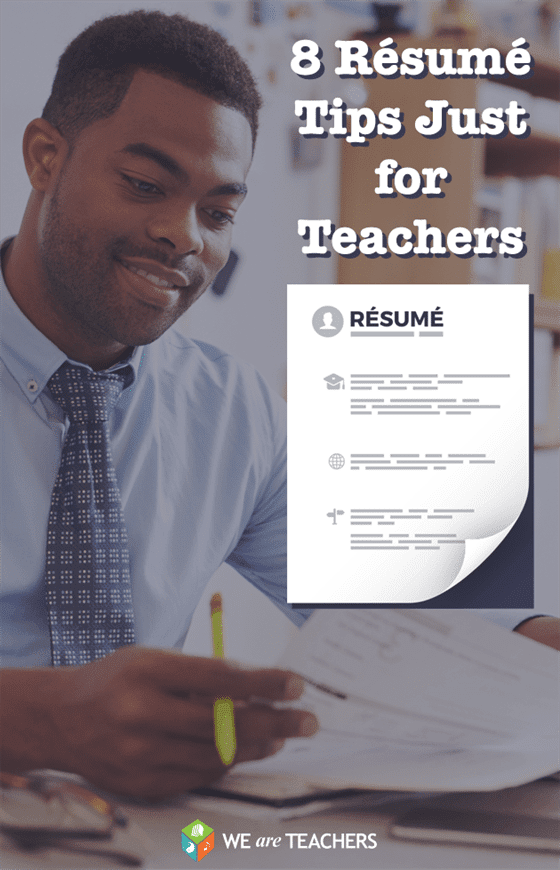There’s no need to stress out about your résumé. Instead, keep a cool head, do your homework, write and rewrite, and get feedback/another set of eyes from a trusted professor or colleague, senior teacher, or school administrator. Before you know it, you’ll have one or two pages (or even three) that do a great job of representing you when you’re not there in a room to speak for yourself.
Here are some tried-and-true résumé tips especially for teachers:
1. Make it easy to read.
Sometimes that means brief, but not always. We’ve heard from teachers on our Helpline that they nabbed great jobs with two- and even three-page résumés. In most cases, job seekers are up against lots of competition. When you realize that your pieces of paper in the pile are going to be evaluated in comparison to all the rest, you’ll rightly tend toward the clear, bold, confident and concise. At the end of the day, though, the résumés that present the best case in the most compelling way win, whatever their length.
2. Capitalize on your status.
In some districts and at some schools, “newbies” seem to be a hot commodity, whereas at others, experience really counts the most. The bottom line? Whatever your status, make the most of it. Instead of trying to hedge bets or be everything at once (not possible), recognize what pool you’re in and aim at being the best of that type. For instance, if this is your first year out of school, make it your goal to write and edit your résumé and other application materials with a goal of rising to the top of the newbie pile! This is a tip mainly aimed at improving your job-hunting attitude: When you capitalize on your status, whatever that may be, you don’t let yourself feel insecure about never having had your own classroom, or about having taught at five different schools in the past six years. Instead, you spend your time turning your truth into a positive.
3. Cast kids in leading roles.
Imagine 100 résumés and applications for a K–1 special education classroom teacher position. Imagine that 87 of those applications talk a lot about the prospective teachers’ philosophies, education and awards. Now think of the 13 applications that include kids—students the applicant has taught, or mention of the particular strengths and challenges of students in the prospective school—prominently in their narratives.
Now think of the hiring committee members, at home after a long day at work, thinking back to what they read. They are hoping to hire a competent, loving, effective teacher for real kids. Which applications are going to come to mind first? Remember to demonstrate your love for teaching children by including mention of children in your application materials. As Harry French, a principal at Greenwood Academy in England, told The Guardian for an article about teachers applying for jobs: “The one thing that we have quite regularly is that people tend to talk about themselves an awful lot and not about the students as much as they could.”
4. Become an expert on schools.
Talk to teachers who work there, study school websites, attend public meetings—do whatever you have to do to understand a school’s culture, challenges and goals, students, and school/parent dynamics. Then use that knowledge to your advantage in deciding which schools to apply to and what to include in your application.
5. Proofread (and here’s how).
Proofreading is best done happy and relaxed. Save it for the end, but leave yourself plenty of time. Pour yourself a nice tall glass of sweet iced tea, sit back and let the proofreading begin!
– Pretend it’s not yours.
– Give yourself points (or a treat) for every mistake you find. Mistakes? Hooray!
– Use the dictionary.
– Double-check names, even if you’re pretty sure you’ve got them right.
Some things teachers especially shouldn’t get wrong on a résumé or cover letter:
– Degrees and how they are written.
– Names of schools.
– Names of people.
– Cover-letter protocol (addresses, dates, salutation).
– Educational buzzwords.
“Just a word of advice for those of you sending in résumés and applications right now,” writes WeAreTeachers reader Elizabeth Bollinger. “Please, please proof your cover letters, résumés, ANYTHING that you are sending to a school for potential employment. I am on the selection committee for my school and out of six applications I just went through, five had typos. That just doesn’t look good when I am selecting a literacy teacher.”
6. Don’t be fancy, just be good.
“I saw some of the resumes first-year teachers were turning in,” reports We Are Teachers reader Vicky Shaw Ballantyne. “8×10 glamour shots of themselves; spiral bound portfolios; coffee cups with their picture on it. It was very disappointing.”
7. Update your résumé/application on online portals frequently.
Here’s a tip: Your online résumé or job history entered painstakingly into a district or statewide HR portal (those things that take hours and hours to complete, and which many districts use in place of individual applications sent to them) ages online. To freshen it and be considered a “new applicant,” go into the portal and make an addition or edit to your information on a regular basis.
8. Deliver it in person.
This isn’t always possible, of course, but when you can, drop by the school you plan to apply to and introduce yourself, with résumé in hand. WeAreTeachers reader Blanca G. says, “I’d go and introduce myself in person first and let them know you are interested and would like to apply and ask if it’s acceptable to send in things now or would they rather you wait. Districts also have to post it internally for a certain time before it even can be public. At least that’s how it is around here.”
Looking for more support? Check out our Facebook page, exclusively for new teachers!
Join our Facebook group WeAreTeachers—First Years! to connect with other new teachers, and learn more about how you can navigate your classroom and life.


